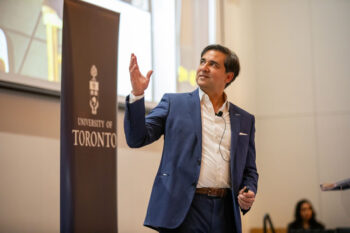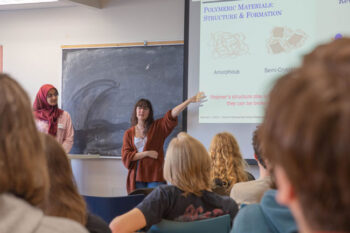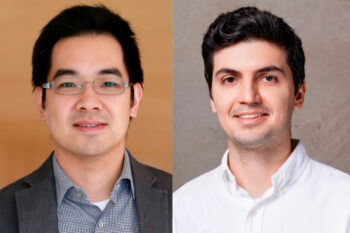Four U of T researchers have received nearly $11.2 million in grants from the Ontario Research Fund – Research Excellence Round 5, a government funding initiative.
Professor Alberto Leon-Garcia (ECE) wants to bring the world of vehicle, transit and transportation management systems into the twenty-first century. The engineer, who was awarded $2,473,000 for “Smart Infrastructures and Applications,” hopes to make the world of commuting a whole lot simpler and safer.
His technology will create a smart network infrastructure that uses and analyzes real-time data from car sensors. The tool will, among many things, better predict onset congestion to help drivers avoid traffic jams and shorten travel time by helping drivers and commuters avoid red lights. It will also decrease drivers’ carbon footprints by reducing the amount of time they spend stopping and starting their cars.
Meanwhile, Associate Professor Emma Master (ChemE) is developing new sustainable approaches for forest and agriculture industries that could see leftover byproducts turned into environmentally friendly products.
She and her team were awarded $2,086,502 for “Forest FAB: Applied Genomics for Functionalized Fibre and Biochemicals” to help the province gain the upper hand on the emerging bioeconomy market.
Professor Master aims to use enzyme catalysts to turn agricultural and forest fibres into a new generation of durable bioproducts.
In addition, Professor Paul Santerre, who serves as Director of the Institute of Biomaterials & Biomedical Engineering (IBBME), a tri-faculty partnership of Engineering, Medicine and Dentistry, was also awarded $2,173,605.
The biomedical engineer will use the grant to develop technology that will address circulatory diseases, which account for one-third of Ontario deaths, as well as to improve the quality of life for patients while reducing treatment costs.
Patients with circulatory diseases often have damaged arteries and veins that prevent blood from flowing freely. Professor Santerre and his team hope to create a minimally invasive procedure to treat circulatory diseases using a drug-coated balloon. This balloon expands and contracts in arteries to safely deliver necessary drugs and is a less-costly alternative to surgery, which can cause a host of post-surgical complications.
Also awarded funds is lead researcher Professor Peter Kaiser at Laurentian University who is working collaboratively with U of T professors John Hadjigeorgiou (MinE), Director of the Lassonde Institute for Mining, Paul Young (CivE), Vice-President, Research and Bernd Milkereit (Physics) along with a team of other University mining experts. The group was given $2,235,370 to develop wireless underground systems to help investors and engineers process minerals with increased speed and safety.
The tri-institutional research program entitled “Smart Underground Monitoring and Integrated Technologies (SUMIT) for Deep Mining” will involve investigators from Laurentian University, University of Toronto and Queen’s University. The project is sponsored by industrial partners of the Centre for Excellence in Mining Innovation (CEMI), namely Rio Tinto, Vale and Xstrata Nickel.
“Congratulations to the recipients of the ORF-Research Excellence Funds” said Cristina Amon, Dean of the Faculty of Applied Science & Engineering. “We are grateful to the Province for investing in these innovative research projects that address a broad range of challenges industry and society faces.”
The Ontario government also named the recipients of the prestigious Ontario Research Fund – Research Infrastructure and Early Researcher Award programs. In total, 11 U of T Engineers were awarded grants to continue their innovative research.



